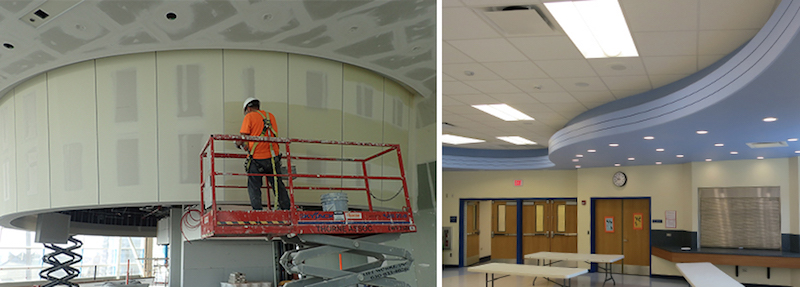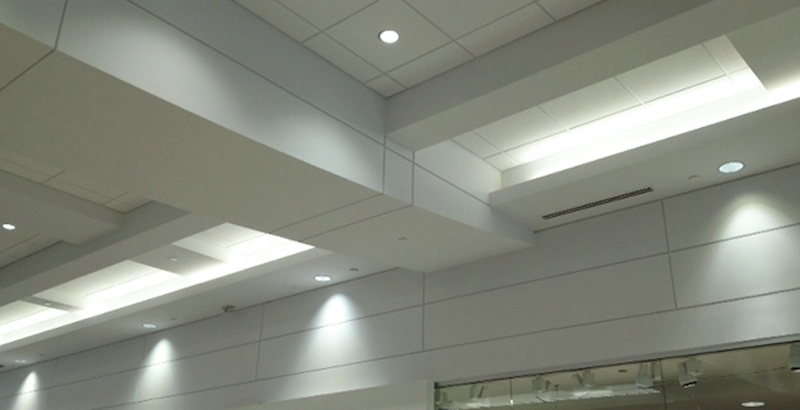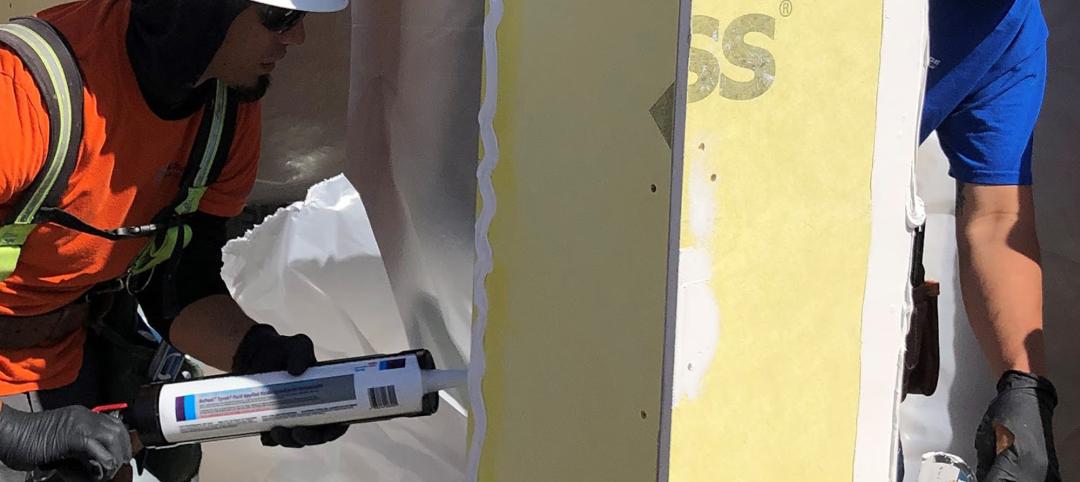Designing with Curved Walls
The benefits of vinyl reveals are unmatched for finishing curved walls. Traditional metal reveals are ideal for clean straight lines on long runs of drywall. Unfortunately, finishing curved walls with traditional metal reveals requires custom ordering and increased lead time for material -- two factors some projects can't manage. However, the material properties of vinyl allow Architectural Reveal Bead to flex and form to curved surfaces right out of the box.
With a tight school renovation budget and timeline, the Oak Grove Elementary cafeteria, designed by RuckPate Architects/CS2 Designs, utilized Architectural Reveals to build curving soffits with a racing stripe reveal design.
Built-in Expansion Protection
Along with the benefit of being able to finish curved interior details, Trim-Tex Architectural Reveals offer expansion protection. Vinyl reveals offer up to 1/8" of expansion protection, which is important to reduce drywall cracking in long runs of drywall.
Trim-Tex Architectural Reveals were used to finish the rotunda at the new Northwestern Mutual Tower in Milwaukee, WI., design by Kendall/Heaton Associates, Pickard Chilton, and Valerio Dewalt Train Associates. Trim-Tex reveals were ideal for adding detail to the curved walls as well as offering needed expansion protection due to the large scale of the ceiling feature.
Responsible Material Choices
Along with cost savings, vinyl reveals offer additional benefits over metal reveals. Unlike metal alternatives, Architectural Reveal Beads won't dent, kink or rust. These benefits save on job site damage costs, as well as future maintenance of the building for years to come.
Architectural Reveal Beads are also a responsible building material choice. All Trim-Tex products are manufactured from at least 70% recycled material.
Sherwood Park Mall, located in Alberta Canada, finished by T Kerr Interior Systems, opted for Architectural Series Reveals and Intersections. The vinyl reveals create straight clean shadow lines over long runs. Additionally, Trim-Tex supplied custom built intersections to speed up project completion by reducing the need for making job site miter cuts. Speed was important in this project as the mall continued to stay in operation during renovations.
 (left) Northwestern Mutual Tower, Milwaukee, Wis. (right) Oak Grove Elementary Cafeteria, Oak Grove, Ill.
(left) Northwestern Mutual Tower, Milwaukee, Wis. (right) Oak Grove Elementary Cafeteria, Oak Grove, Ill.
Cost savings, superior quality, and flexibility that vinyl reveals afford have architects rewriting their specifications for Trim-Tex Architectural Reveal Beads. Request free samples of all Trim-Tex products at www.trim-tex.com
For more information including Submittals, Specifications, and CAD/BIM on Trim-Tex Architectural Reveals please visit http://www.trim-tex.com/products/overview/commercial-beads/shadow-reveal-beads/architectural-reveal-bead/
Related Stories
AEC Innovators | Mar 3, 2023
Meet BD+C's 2023 AEC Innovators
More than ever, AEC firms and their suppliers are wedding innovation with corporate responsibility. How they are addressing climate change usually gets the headlines. But as the following articles in our AEC Innovators package chronicle, companies are attempting to make an impact as well on the integrity of their supply chains, the reduction of construction waste, and answering calls for more affordable housing and homeless shelters. As often as not, these companies are partnering with municipalities and nonprofit interest groups to help guide their production.
Codes | Mar 2, 2023
Biden Administration’s proposed building materials rules increase domestic requirements
The Biden Administration’s proposal on building materials rules used on federal construction and federally funded state and local buildings would significantly boost the made-in-America mandate. In the past, products could qualify as domestically made if at least 55% of the value of their components were from the U.S.
AEC Innovators | Mar 2, 2023
Turner Construction extends its ESG commitment to thwarting forced labor in its supply chain
Turner Construction joins a growing AEC industry movement, inspired by the Design for Freedom initiative, to eliminate forced labor and child labor from the production and distribution of building products.
AEC Innovators | Feb 28, 2023
Meet the 'urban miner' who is rethinking how we deconstruct and reuse buildings
New Horizon Urban Mining, a demolition firm in the Netherlands, has hitched its business model to construction materials recycling. It's plan: deconstruct buildings and infrastructure and sell the building products for reuse in new construction. New Horizon and its Founder Michel Baars have been named 2023 AEC Innovators by Building Design+Construction editors.
Codes and Standards | Feb 8, 2023
GSA releases draft of federal low embodied carbon material standards
The General Services Administration recently released a document that outlines standards for low embodied carbon materials and products to be used on federal construction projects.
Concrete | Jan 24, 2023
Researchers investigate ancient Roman concrete to make durable, lower carbon mortar
Researchers have turned to an ancient Roman concrete recipe to develop more durable concrete that lasts for centuries and can potentially reduce the carbon impact of the built environment.
Standards | Jan 19, 2023
Fenestration Alliance updates liquid applied flashing standard
The Fenestration and Glazing Industry Alliance (FGIA) published an update to its Liquid Applied Flashing Standard. The document contains minimum performance requirements for liquid applied flashing used to provide water-resistive seals around exterior wall openings in buildings.
Sponsored | Resiliency | Dec 14, 2022
Flood protection: What building owners need to know to protect their properties
This course from Walter P Moore examines numerous flood protection approaches and building owner needs before delving into the flood protection process. Determining the flood resilience of a property can provide a good understanding of risk associated costs.
K-12 Schools | Nov 30, 2022
School districts are prioritizing federal funds for air filtration, HVAC upgrades
U.S. school districts are widely planning to use funds from last year’s American Rescue Plan (ARP) to upgrade or improve air filtration and heating/cooling systems, according to a report from the Center for Green Schools at the U.S. Green Building Council. The report, “School Facilities Funding in the Pandemic,” says air filtration and HVAC upgrades are the top facility improvement choice for the 5,004 school districts included in the analysis.
University Buildings | Nov 13, 2022
University of Washington opens mass timber business school building
Founders Hall at the University of Washington Foster School of Business, the first mass timber building at Seattle campus of Univ. of Washington, was recently completed. The 84,800-sf building creates a new hub for community, entrepreneurship, and innovation, according the project’s design architect LMN Architects.
















